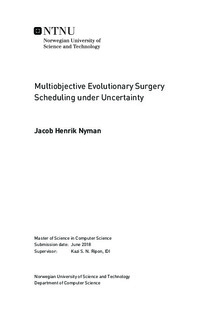Multiobjective Evolutionary Surgery Scheduling under Uncertainty
Abstract
Surgery scheduling is the task of allocating resources to surgical procedures over time. Because hospitals are dynamic environments governed by uncertainty, difficult priorities and careful coordination of scarce resources, machine scheduling algorithms are generally not directly applicable to surgery scheduling problems. This thesis attempts to develop new genetic operators that can integrate the power of evolutionary machine scheduling algorithms with the dynamics that are present in real life hospitals. Our most important contribution is a fast simulation approach for evaluating surgery schedules under surgery duration uncertainty. We implement the developed genetic operators and apply the strength pareto evolutionary algorithm 2 and non-dominated-sorting genetic algorithm \textrm{II} to the multiobjective surgery admission planning problem. In this problem, patients are selected from a patient waiting list and scheduled into operating rooms over a weekly period in a way that maximizes resource utilization and minimizes patient waiting time on the waiting list. The algorithm output is a set of detailed and compatible surgeon and operating room schedules that are robust against surgery duration variability. Our analysis exemplifies how significant overtime reduction can be achieved by incorporating uncertainty in the optimization process. Because handling multiple objectives and uncertainty simultaneously quickly becomes complicated, we acknowledge that hospital managers preference regarding performance trade-offs and risk should be integrated in the future.
